
The setting was relaxing, a bright and comfortable first-floor lounge in Chu Hall, for discussing a topic that can seem taxing: the college search.
Held last Saturday morning, the Reunion session gave alumni and their college-bound some practical and heartening advice from three admission experts.
The offerings came from Darryl Uy, who is director of admission at Bates, and fellow admission experts Aya Murata ’92 and Katie Moran Madden ’93.
Here are a few tips and observations from the session.
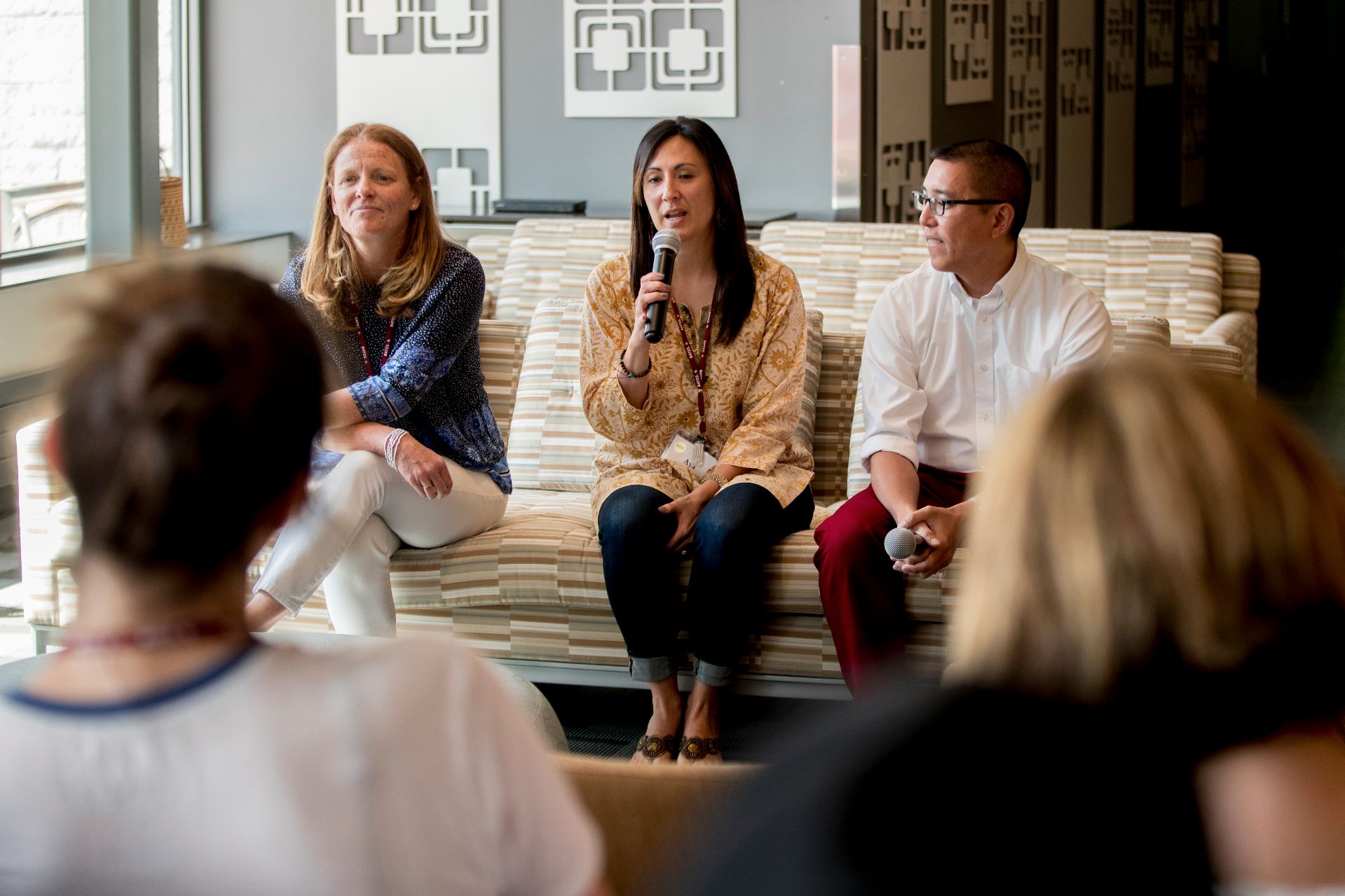
Aya Murata ’92 (center), a college counselor at Phillips Academy, speaks to the alumni gathering during Reunion. At right is Bates Director of Admission Darryl Uy, and at left is Katie Moran Madden ’93, senior associate director at Dartmouth. (Phyllis Graber Jensen/Bates College)
Reverse Your Thinking
“Families sometimes go at the college process backwards,” said Uy, who joined Bates in 2016. “They have an idea of where they want to go to college, then they do everything they can to get there.”
Instead, he suggested, the process should “start with you, the student — who you are, what you are interested in, and what you might want to do. Then find the schools that match your values and interests, rather than vice versa.”
It’s All About the Why
“How does a student find a college that matches their interests?” asked a parent, Elizabeth Leavitt Nemirovsky ’88 asked.
The answer is actually a question: “Why?”
Because the college search begins with self-awareness and personal assessment, “a lot of this process is about the why,” said Uy. “It’s OK to say you want to be a lawyer, or be pre-med, or pursue engineering, but ask yourself why. What sparked that interest? Is it what you want to do, or is because of societal or parental pressure?”
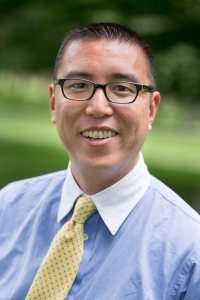
The process of identifying a college that feels right to your child is “about the why,” says Darryl Uy, director of admission at Bates (Phyllis Graber Jensen/Bates College)
From there, a student can ask other questions. “How are you motivated? Is it competition or grades or just wanting to do your best?” From there, students can then look at environmental factors. “Do you want a big university or a smaller college? Close or far from home?”
Put on Blinders
Murata, who is a college counselor at Phillips Academy in Andover, Mass., was attending Reunion with husband Mike Charland ’93 and their two children, one of whom is a rising high school senior.
She encourages students and their families to “be willing and able to put on blinders.” That means trying to tune out all the noise around the college search “and look internally and reflect on what’s important to you. Don’t key off what is out there.”
Instead of paying attention to what everyone else is doing, “investigate your own personal desires, inspirations, interests, and what you are curious about. Let that be the driver.”
Try to ignore the college-search chatter, “the advice from the second chair of the trumpet section, or your teammate’s opinion about a particular college, or what your English classmate says you are ‘supposed’ to do over the summer. Let it go: Be confident in listening to your inner voice.”
To be sure, there is no “predictive formula” when it comes to the college search, said Madden, who is a senior associate director of admission at Dartmouth.
“So rather than trying to squeeze yourself into some magic admission formula that doesn’t even exist,” added Murata, “be authentic to who you are. Think about the things that matter most to you.”
You Hear the Wrong Things
In terms of comfort, each expert noted how the media (and well-meaning family members, friends, and others) tend to fixate on how the college admission process is about not getting into college, when, in reality, it’s exactly about the opposite.
“Everything you read is about who does not get in where — and speculation about why,” said Madden. “But in reality, most everyone lands somewhere and goes on to have a very positive experience.”
It’s About Academics — And More
“If one part of you is not aligned in college — if the academics are great but the community doesn’t feel right — you won’t bring your best self to your college experience,” said Murata.
She should know. As a high school senior deciding between Bates and another college, Murata chose the other. In her first year, “the personal fit was not what I imagined college to be.” Greek life on campus didn’t suit her. “The community felt divided.”
So she transferred to Bates. “That was life-changing,” and it was an a-ha moment that has stuck with her. “I realized, so this is what people talk about when they talk about ‘fit.’”
The lesson: You should be able to see yourself in your college community.
Let Uncertainty Be Part of the Process
Students get peppered with that awful question, “So, what are you thinking about for college?” That applies “unneeded pressure,” Murata told the parents.
Instead, Murata shared advice that she picked up from Bates’ Purposeful Work program, specifically that adults can help students identify their interests, because identifying what interests us is the first step toward discovering purposeful work — and it turns out, a college that fits.
“Try asking your child something like, ‘Hey, tell me about what you are studying these days that is piquing your interest?’”
Adults can also be reflectors: reminding students of experiences, such as a favorite class, topic, or program, that jazzed them and thus might hint at a future college interest.
“As a student, you have a right to be uncertain and to explore. You don’t need to have it figured out. You don’t need a grand master plan. You can be in a place where you are unsure. That is OK.”
Values Matter
Colleges often talk about their values and culture, and those can seem like highfalutin concepts to a 17-year-old. They’re not.
“Students should ask about the values of a college and how those values are transmitted throughout the institution,” says Murata because they affect student life. Take Bates, for example. “Bates values permeate this community, and those values in turn become part of the culture a student experiences.”
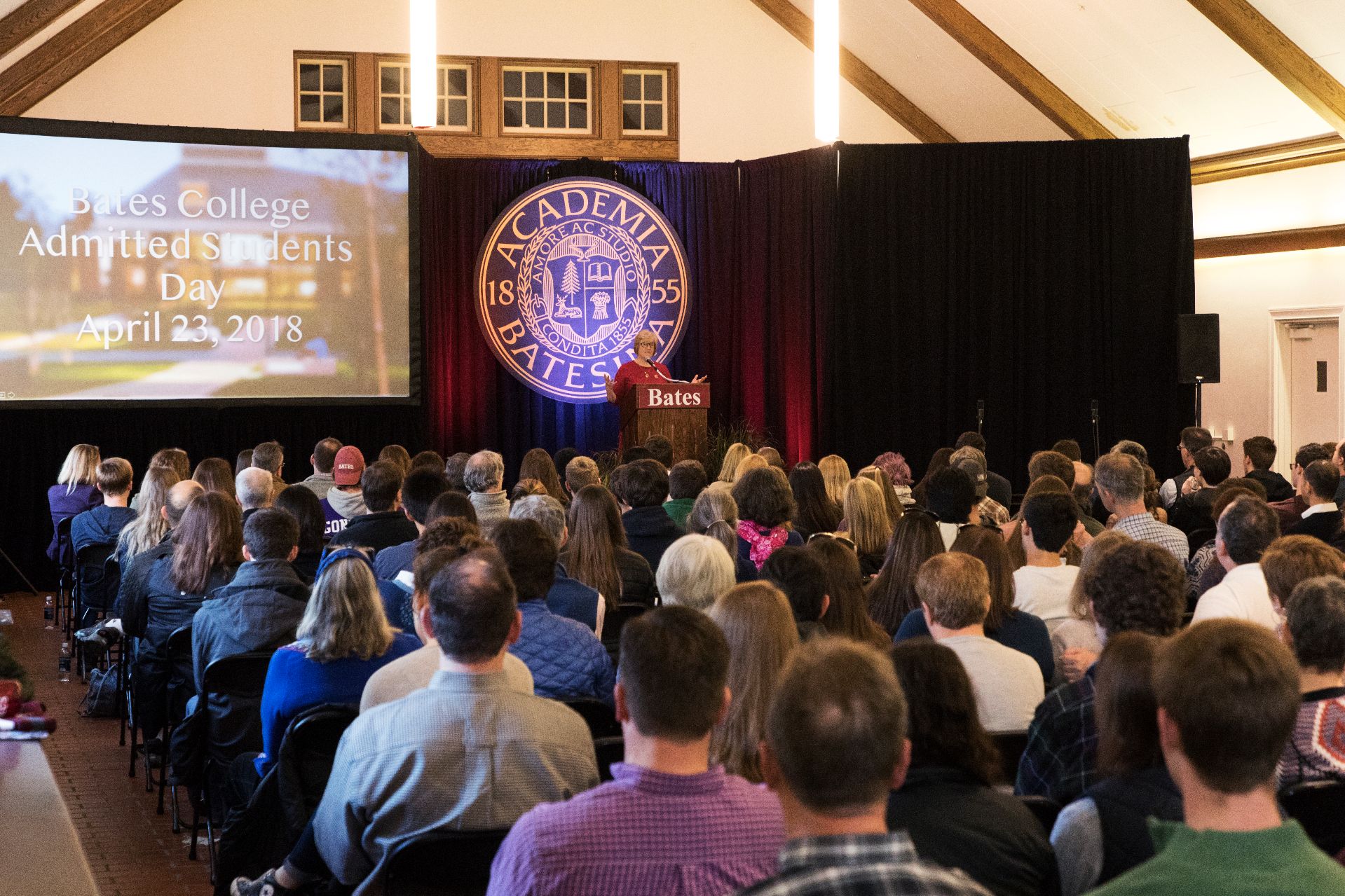
President Clayton Spencer speaks to admitted students and their families during a campus reception in April. A record number of prospective students applied to the incoming Class of 2022. (Theophil Syslo/Bates College)
Still, “the cultural piece is hard to get your hands on from a college publication or website.” So Murata advises students to be active in their visits. “Talk to the tour guides. Take time on campus to hang out or have lunch with a student, if that’s offered. Sit on a bench and watch how people move from class to class.”
Just Connect
Not all students are able to visit a campus. Whether you can visit or not, there are creative ways to gather the more amorphous information. For one, students should check out a college’s social channels or student-driven social channels.
“No matter where you are in the world, you can be on a school’s Instagram feed,” said Madden. “It’s a different way to connect but you can still connect.”
The Early Decision Question
Uy has heard this line from students: “They’ll say, ‘I want to apply Early Decision, but I don’t know what college.’” Problem is, “that’s like saying, ‘I want to get married, I just don’t know to whom yet.’”
Early Decision makes sense for the student who is all-in on one college. But you need to feel a total commitment to a college. “Ninety-nine percent is not enough because that 1 percent of doubt will eat at you all senior year and make you question your decision,” Uy said.
You Control Your Essay
Simply put, the essay matters. “It’s one of the more important pieces in the application beyond the numeric measures of data, such as your high school transcript,” said Uy.
From the college’s perspective, “it helps us understand who you are as an individual: What motivates you, what inspires you, how you will fit into the community, how you will inspire your peers, how you will challenge yourself.”
Importantly, it is also “part of the process that you control,” said Madden.
The Seinfeld Approach to the Essay
Uy and Madden made it clear that your essay should not hinge on epic or cataclysmic events in your life. “It’s not an exercise in the bizarre,” adds Uy, recalling an essay about dating that recounting the applicant’s “first time.”
Some of the best essays can be “Seinfeldian,” he said. “They could be about nothing but a few moments in your ordinary life that I can’t find anywhere else in your application. If you could take me into your life for 5 minutes, I think that is a successful essay.”
Still, they say, the personal essay does hinge on good writing and an authentic voice.
“Try to find a topic that resonates with you and your experiences so your personality and voice can shine through,” Uy said. “Don’t curate yourself to the point you are not authentic,” added Madden.
Essay Do’s and Don’t’s
“If you’re not funny in real life, don’t try to be funny in your essay. That rarely works,” Uy said.
Students might think twice about arguing a current issue or cause in their essay — but not because it might be controversial. “We want to know about your interests or political perspectives, because we are all shaping communities and we’re trying to encourage dialogue,” Madden said.
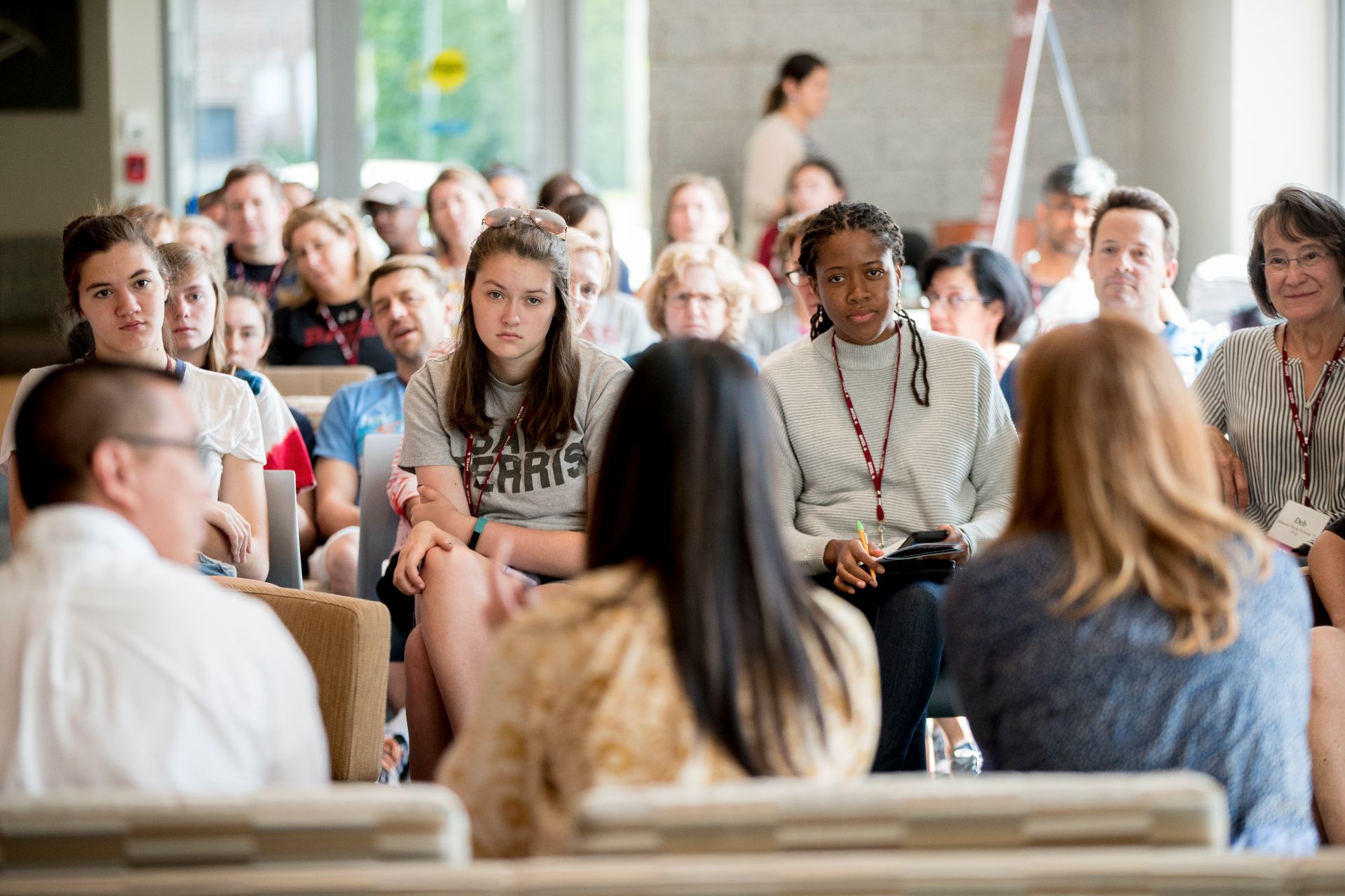
Alumni and their college-bound children listen to Darryl Uy, Aya Murata ’92, and Katie Moran Madden ’93 during the June 9 Reunion conversation about the college search. (Phyllis Graber Jensen/Bates College)
Rather, in writing about a current issue or cause, “we often learn more about the cause than about you,” explained Madden. And that defeats the goal of the essay.
He also advised against writing about death, divorce, and depression. Not because they’re taboo or upsetting, but because “those topics are very difficult for a 17-year-old to address in 650 words in a way that is going to come across as mature and reflective. The treatment we see is often clichéd.”
A Question of Merit
To put their best foot forward, students need to understand what colleges have to do: “We’re evaluating applications from more qualified applicants than we have seats in our class,” said Madden.
To do that, “we assess merit, and each college or university may assess merit differently, depending on their own individual communities and institutional needs,” she explains.
To assess academic merit, colleges look at a range of factors, especially the transcript.
“We also assess merit through extracurricular activities and talents. We assess it through your intellectual engagement, which we glean from your writing and your recommendations.
The essay, she says, offers students an opportunity to share their personal qualities and what they value. “And that is about merit, too,” she said. “All of us are trying to shape a community. And we try not to create a community of people with similar talents, interests, perspectives.”
To that end, “make the essay about you. It doesn’t have to be exciting. It doesn’t have to move us.”
Parents Who Push
Murata handled a question about parents who call the shots on college choice.
While she can play the role of “intermediary” on occasion, “ultimately the student does have to advocate for their education. It’s not the parent or guardian who is going to college. But it is tricky if a parent says, ‘I’m paying so you go where I want you to go.’”
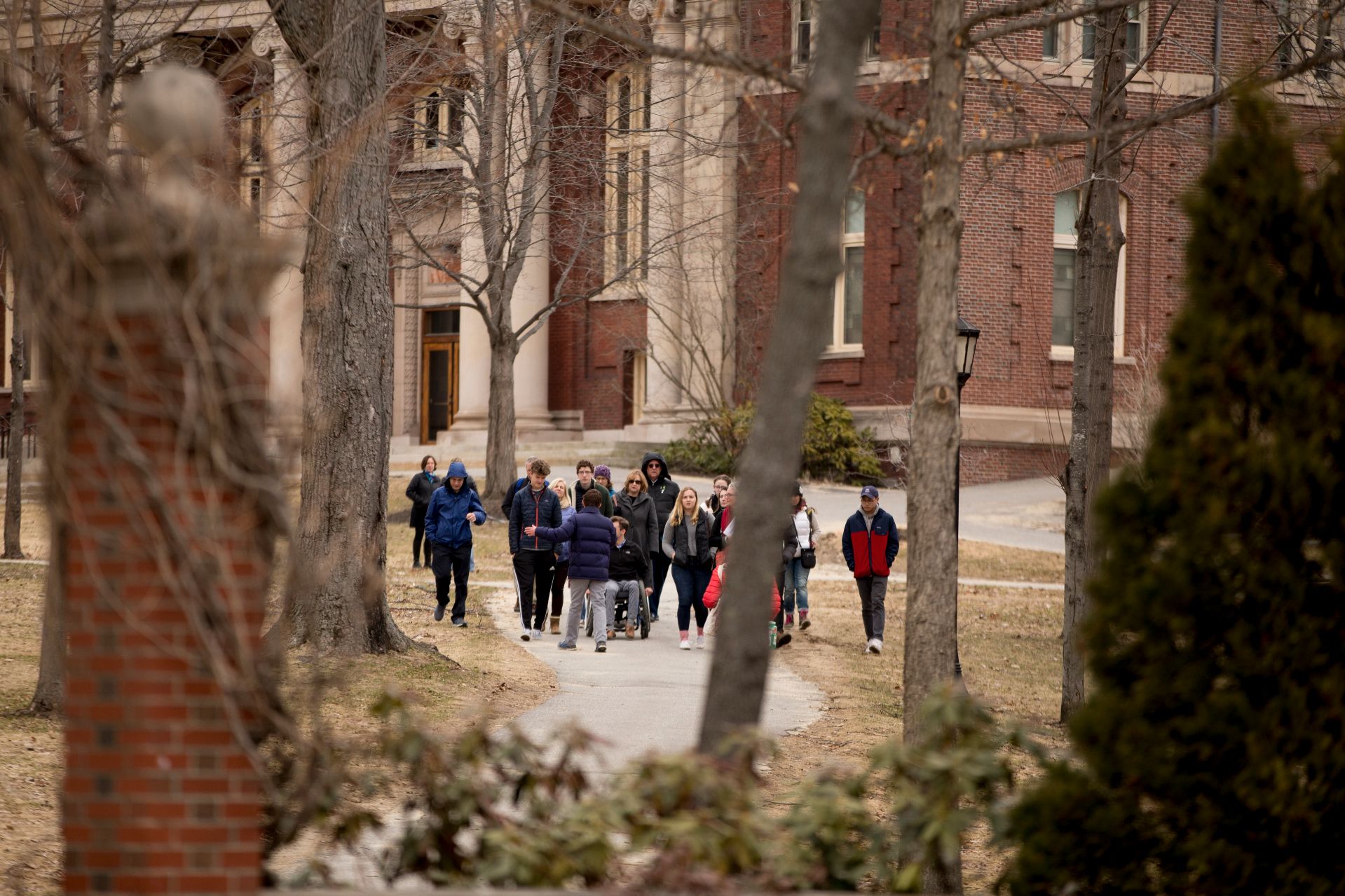
Prospective students tour Bates in early April. Through social media or a virtual tour, students can get a feel of a college’s culture even if they are not able to visit. (Phyllis Graber Jensen/Bates College)
Her advice is to take a long view and try to avoid “drawing a line in the sand.” In other words, try to have “ongoing conversations” that help the parents come to see that their child’s happiness and opportunity to thrive is at stake. “Help your parents reflect on who you are. Help them see how you would be supported at one school versus another.”
Start Fresh
She reminded parents that “it’s been a long time since we’ve been in college, and colleges have changed a lot since we went through the process.”
“Both students and parents need to start the college process with a clean slate and an open mind.”
Often, well-meaning parents and relatives can “have very outdated perceptions of schools, and that can be difficult for some students to push back on. Both students and parents need to start the college process with a clean slate and an open mind.”
Above all, she said, the college search — from the college a student wants to attend to the one they attend — is “not a referendum on your skills as a parent.”
Instead, “try to focus on what is best for them: a learning community where they can jump in with both feet and follow their interests and curiosities and feel connected both inside and outside the classroom.”
A Recommendation about Recommenders
In addition to controlling their essay, students also have more control than they think when in comes to recommendations.
“You choose who you ask for recommendations,” Madden said. “So choose teachers who know you well — not just teachers whose courses you got an A in.”
“Seek out teachers they’ve engaged with and people who know them well.”
“Let’s say you got an A in math. Maybe you do well in math because it comes naturally to you. So you choose the teacher on that basis, and the recommendation that we get says, basically, ‘She’s really good at math.’”
Since talent is pretty easy to identify — and since every student applying to college will have some talent in something — that’s an unhelpful recommendation.
Instead, “we encourage students to seek out teachers they’ve engaged with and people who know them well.” Such teachers might be ones who’ve “seen you take a dissenting opinion in class, or seen you collaborate with peers, or seen you take feedback or setbacks well.”
When a recommendation shares that information, it “brings you, your personality, what you will add to the classroom to life.”
Dinner Rules
Families should establish some ground rules before they begin the college search so that every encounter between parent/guardian and child isn’t always about college. A longstanding piece of advice is for families to set aside a specific time each week to talk about the college process. It’s a time to share what each of you needs,” Murata said.
And try not to have that be during your family dinner. “If every family dinner is going to be about the college search or SATs or some college-related checklist, I guarantee family dinner won’t be much fun.”



